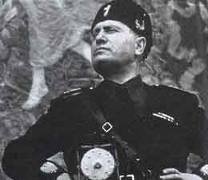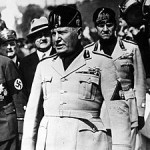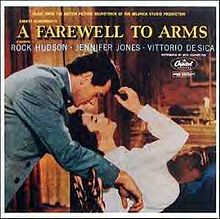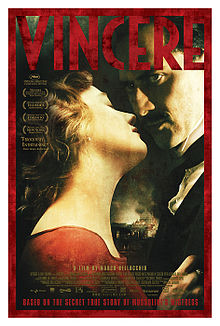 Benito Mussolini had a father who believed in socialism, anarchism, and republicanism. Like his father, Mussolini also praised Giuseppe Garibaldi for successfully overthrowing the royal family and unifying Italy. After moving to Switzerland, he got to know Lenin, who had taken refuge in Switzerland; Mussolini learned German and French from Lenin, and they built a relationship of mutual respect. In his youth, Mussolini adored Karl Marx’s ideology and believed in class struggle. After returning from Switzerland to his home country, Mussolini joined the Italian Socialist Party, but since he advocated for participation in World War I, he was expelled from the Socialist Party that insisted on staying neutral. It is said that Lenin was very disappointed with the Italian Socialist Party for expelling Mussolini, whom he believed to be smart and promising.
Benito Mussolini had a father who believed in socialism, anarchism, and republicanism. Like his father, Mussolini also praised Giuseppe Garibaldi for successfully overthrowing the royal family and unifying Italy. After moving to Switzerland, he got to know Lenin, who had taken refuge in Switzerland; Mussolini learned German and French from Lenin, and they built a relationship of mutual respect. In his youth, Mussolini adored Karl Marx’s ideology and believed in class struggle. After returning from Switzerland to his home country, Mussolini joined the Italian Socialist Party, but since he advocated for participation in World War I, he was expelled from the Socialist Party that insisted on staying neutral. It is said that Lenin was very disappointed with the Italian Socialist Party for expelling Mussolini, whom he believed to be smart and promising.
Mussolini enlisted in World War I; after returning from the war, he formed the National Fascist Party in 1921 with support from Great Britain, and he repeatedly battled with the Socialist and Communist Parties. Both Great Britain and America praised him, saying, “Mussolini is an ideal leader in these new times,” and American newspapers reported him favorably through the first half of the 1920s. Winston Churchill also at first held Mussolini in high esteem as “one of the great leaders of our times.” However, Ernest Hemingway had concerns about Mussolini relatively early on. On a personal level, it is said that Adolf Hitler at first respected Mussolini, but Mussolini hated Hitler. Due to the alliance between Germany and Italy that later developed, the relationship between Mussolini and Hitler gradually improved, but when it became clear Italy was losing in World War II, Hitler’s attitude towards Mussolini gradually became cold.
 Mussolini, in addition to Italian, was proficient in English, German, and French, and it is said he was a cultured person who understood philosophy and the arts. After Italy’s defeat in World War II, he tried to flee to neutral Switzerland, and it is said he planned to go from there to Spain—another neutral power that was governed by Gernalísimo Franco, the only fascist administration that remained in Europe. However, on his way to Switzerland, he was discovered by partisans, and was executed with his lover Clara Petacci by shooting; his corpse was hung in Piazzale Loreto in Milan. The hanging was done by a rope from a rooftop in the piazza; since this was the same style in which those who offended the fascist administration were hung to their death in the streets, this act appeared to be the partisans’ retaliation against the fascist administration. It is said that Mussolini, who was never interested in filling his own pockets while in power, left behind barely any assets after his death. After their deaths, people in Italy did not hate Mussolini as much as those in Germany hated Hitler, and although people have some bad images of Mussolini, they still have a relatively good impression of him for completely oppressing the mafia and for his efforts to improve employment.
Mussolini, in addition to Italian, was proficient in English, German, and French, and it is said he was a cultured person who understood philosophy and the arts. After Italy’s defeat in World War II, he tried to flee to neutral Switzerland, and it is said he planned to go from there to Spain—another neutral power that was governed by Gernalísimo Franco, the only fascist administration that remained in Europe. However, on his way to Switzerland, he was discovered by partisans, and was executed with his lover Clara Petacci by shooting; his corpse was hung in Piazzale Loreto in Milan. The hanging was done by a rope from a rooftop in the piazza; since this was the same style in which those who offended the fascist administration were hung to their death in the streets, this act appeared to be the partisans’ retaliation against the fascist administration. It is said that Mussolini, who was never interested in filling his own pockets while in power, left behind barely any assets after his death. After their deaths, people in Italy did not hate Mussolini as much as those in Germany hated Hitler, and although people have some bad images of Mussolini, they still have a relatively good impression of him for completely oppressing the mafia and for his efforts to improve employment.
Mussolini had a long relationship with Rachele Guidi—the daughter of Mussolini’s father’s lover, Ana Guidi—and in 1910, Rachele had their daughter Edda. He had his first marriage ceremony with Rachele in the town hall in 1915, but after becoming famous as a politician, Mussolini had a second, Catholic-style wedding ceremony with her in 1925.
However, according to Marco Zeni’s books published in 2005, the possibility was discovered that when Mussolini got a job as a journalist and moved to Trento in 1909, he met Ida Dalser, who was from the area, and they married in 1914. Mussolini, struggling to make ends meet, got financial assistance from Ida, who supported Mussolini’s socialist ideals; in 1915, Ida bore Mussolini his first son, Albino. The reason this marriage wasn’t publically known until 2005 is that it is said that Mussolini’s administration completely destroyed all official documents regarding Ida Dalser and Mussolini, as well as destroyed the correspondence between the two of them as much as possible. Both Ida and Albino died in mental hospitals, and in particular, there is a strong possibility that Albino, who died when he was just 26 years old, was killed. This situation is depicted in Vincere.
If this is true, Mussolini seems to have had relations with Ida from 1909 to 1915, even though he was formerly involved with Rachele. Furthermore, if the marriage with Ida was official and there was no official divorce, Mussolini committed the crime of bigamy. Either way, by 1915, Mussolini had abandoned Ida—who understood and loved him as a socialist—and he chose Rachele as his wife. Mussolini had a complicated life path, but certainly around World War I, he experienced a major turning point in both his public and private life.







